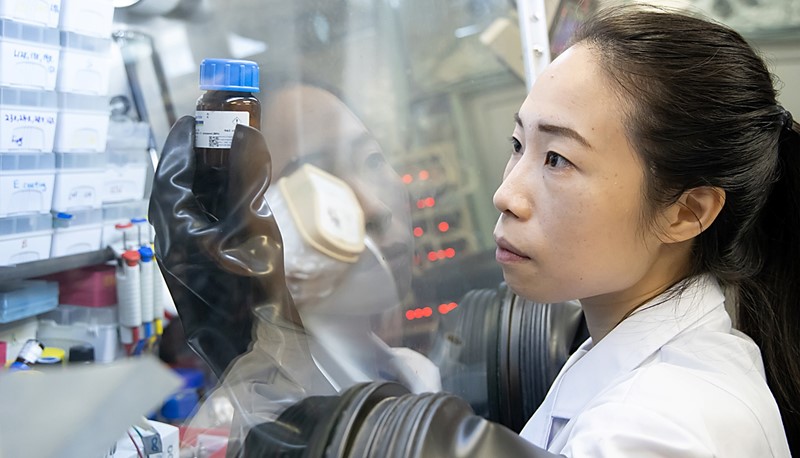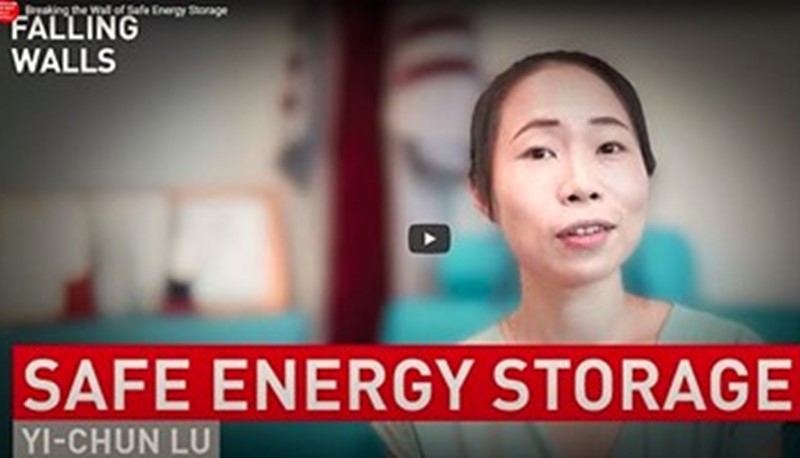
Building a better battery: The quest for clean energy

Prof. Yi-Chun Lu has created a safer, cheaper and more environmentally friendly battery as a substitute for commercial lithium-based batteries.
Developing new technologies for affordable and clean energy will be critical for meeting the needs of a growing population globally while also meeting carbon reduction targets. CUHK Engineering’s cutting-edge research has now made possible a whole new generation of safe, low cost and environmentally friendly batteries.
Prof. Yi-Chun Lu of the Department of Mechanical and Automation Engineering has created a battery that uses a water-based electrolyte system instead of the flammable electrolytes typically used in lithium-based batteries. Prof. Lu’s battery can reach the same voltage as a lithium-based battery, but is non-flammable, non-toxic, and seven times cheaper. Her ground-breaking work has been published in Nature Materials.
Lithium-based batteries are expensive to produce, not environmentally friendly and, most importantly, unsafe under certain conditions. Yet these high energy, rechargeable batteries are indispensable for running the cell phones, laptops and other electronic devices that we depend on in our daily lives. This inspired Prof. Lu and her team to create a new type of battery that carries no danger of explosion or fire, nor any risk to the environment.
Safer, cheaper and more environmentally friendly
While water-based batteries have been around for many years, they have never been capable of generating sufficient voltage to make them useful. The solution developed by Prof. Lu’s team was to adopt a water-soluble polymer called polyethylene glycol (PEG).
PEG acts as a crowding agent, surrounding water molecules with hydrogen bonds to prevent decay from changes in the water structure. As a result, the battery developed by Prof. Lu’s team can successfully expand its capacity to 3.2 volts, making it competitive with the low end of the lithium-based battery market.
‘This is a breakthrough,’ says Prof. Lu. ‘PEG is commercially available as an ingredient, lightweight, and 30 to 100 times cheaper than lithium salts. It is also non-toxic and does not harm our environment.’
Prof. Lu has applied for a patent and is working on increasing the voltage of the electrolyte and enhancing its stability. She is now seeking a private-sector partner with relevant experience and capacity to produce and test the battery prototype, with the aim of launching the final product within the next three to five years.

Prof. Lu has applied for a patent for the water-based battery and is looking to commercialise it.
Breaking the wall of safe energy storage
In recognition of this promising innovation, Prof. Lu was honoured as one of the top ten scientists in the engineering and technology category of the 2020 Falling Walls Science Breakthroughs of the Year Awards. She was the only female Asian scientist in the top ten of this category.
Prof. Lu is among the top ten scientists of the 2020 Falling Walls Science Breakthroughs of the Year Awards (engineering and technology category).
More recently, Prof. Lu achieved another breakthrough in green battery technology by extending the lifetime of redox flow batteries, which are known for their high safety, dense power and design flexibility. This represents a great leap forward in the application of such batteries in the grid-scale storage of renewable energy. This work has been published in Nature Energy.
As the world grapples with the challenge of energy security and climate change, CUHK researchers like Prof. Lu will continue to drive a green energy transformation by developing sustainable energy solutions that work on a global scale.
Watch the video to learn more about Prof. Lu’s research
Read more:
- Making it big: Lu Yi-Chun in top 10 in global science Breakthroughs Award
- Breakthrough by CUHK Engineering in battery research: Electrolyte made with skin cream ingredients enables stable and non-flammable aqueous li-ion batteries
- A better battery: Lu Yi-Chun opens up a new generation of batteries
- CUHK Engineering develops new technology extending the lifetime of redox flow batteries and the development of grid-scale energy storage
